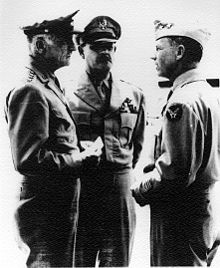
Back Bomber Mafia Spanish Bomber Mafia Italian Бомбардировочная мафия Russian Бомбардувальна мафія Ukrainian

The Bomber Mafia were a close-knit group of American military men who believed that long-range heavy bomber aircraft in large numbers were able to win a war. The derogatory term "Bomber Mafia" was used before and after World War II by those in the military who did not share their belief, and who were frustrated by the insistence of the men that the heavy bomber should take a primary position in planning and funding.
The bomber mafia succeeded in their goal to have extensive bomber fleets in the US military, but they failed in their wish to achieve pinpoint targeting precision during World War II. Instead, the bomber fleets were a major factor in the general American war effort, helping to reduce the enemy fighting power, especially in Japan where they destroyed the largest cities by shifting to area incendiary bombing tactics. After the war, the 20 years of foundational work by the bomber mafia resulted in the separation of the United States Air Force from the Army to become an independent military arm.[1] The bomber mafia's strategic doctrine, changed by war and experience, helped shape the mission of the new U.S. Air Force and its Strategic Air Command.[2]
Many years later, in the 1960s and 1970s, a related term, "Fighter Mafia," described those within the U.S. Air Force that favored lightweight fighters good at dogfighting instead of heavy missile-firing fighters.